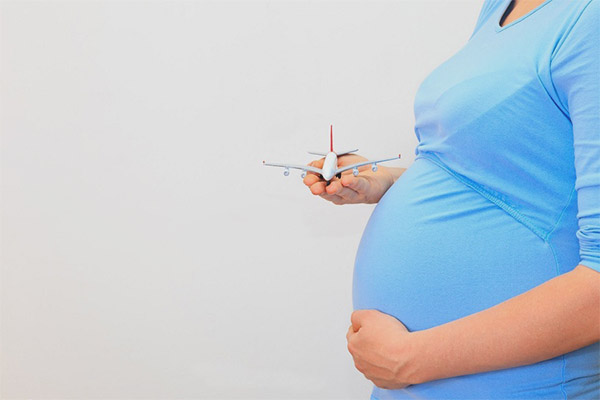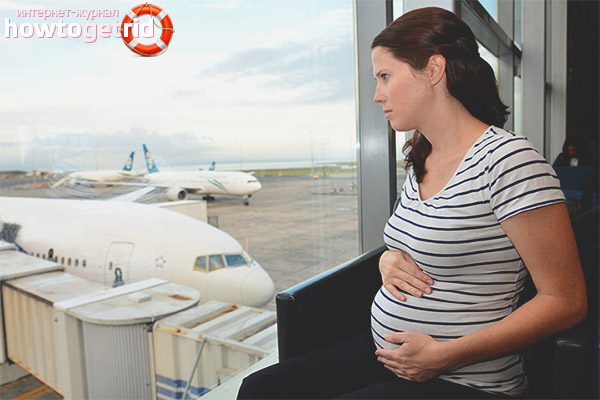The content of the article
Travel and trips bring a lot of positive emotions, however, they are primarily associated with a long journey and flights. In the normal state, this does not cause any concern, but in the state of pregnancy women have a huge number of questions, one of which is how dangerous it can be for a pregnant woman to fly. In addition, many are interested in how to properly travel with the stomach, as well as many other important and disturbing questions.
Pregnancy is a special condition of a woman, which is always accompanied by a multitude of fears, many of which are merely prejudices. For example, many elderly ladies claim that during pregnancy it is impossible to cut hair, and some mothers say that buying things for a child in advance is a bad sign.However, such signs and instructions are not at all able to ruin the life of the expectant mother or somehow harm the child.
As for travel, there are more significant concerns, because the impact of the aircraft can have an effect on the female body. For this reason, it is necessary to thoroughly investigate the problem and determine whether the flight on an airplane may indeed be dangerous, or it is nothing more than prejudice. It is worth noting that experts have not yet come to a common opinion regarding flights for pregnant women. For this reason, most doctors simply refer to travel and flights as an undesirable risk.
What usually causes concern?
There are several factors that most often cause concern in future moms:
Changes in pressure and, as a consequence, the occurrence of too early childbirth
A well-known fact is that women in a state of pregnancy are very sensitive to pressure changes. In flight, its performance can be particularly felt at the beginning and end of the journey. It is impossible to understand and predict in advance exactly how a woman will survive such shocks.Nowadays, there is an opinion that sudden pressure drops can provoke too early childbirth. However, it is necessary to take into account that reliable data confirming this does not exist today. As for preterm labor, they may not be able to fly. The only problem is, if the birth takes place on earth, there will be an opportunity to call an ambulance and get qualified help. There are no such advantages in the air. The risk of preterm birth can be determined even on earth using ultrasound. Some airlines today even introduce some rules that limit the possibility of flights for future mothers. For example, in some cases, women are not allowed on board the aircraft during late pregnancy.
Not enough oxygen
Indeed, during the flight, the volume of oxygen in the cabin of the aircraft somewhat decreases, which causes fears in future mothers. As a rule, they are afraid that the child may experience oxygen starvation. However, Swiss scientists conducted a study and determined that the decrease in oxygen does not affect the amount of gas in the blood of women, as well as the status of the fetus during the flight.For this reason, modern science sees no danger in a slight decrease in oxygen. It should be borne in mind that these studies are relevant only for those women who do not have any abnormalities in their condition. For example, women suffering from anemia, will carry the flight much harder. Therefore, this factor is a contraindication to flying on an airplane.
Venous diseases and congestion in the veins.
First, it is better to wear compression stockings during the flight.
Secondly, during the flight you need to drink as much water as possible. It is not recommended to drink drinks with caffeine content before the flight and during it.
In addition, it will be useful to walk about 10 minutes every hour in the cabin.
Radiation exposure probability
Radioactive radiation from space is not at all a myth. This phenomenon does exist and is carefully studied in institutions such as NASA. Their main task is the safety of astronauts. Being on earth, we can not be afraid of radiation from space, because we are protected by a large atmospheric layer. However, at the flight altitude of the aircraft, the layer of protection is less, as a result of which the danger of radioactive radiation increases. It is worth noting that at the end of the last century, the United States Aviation reported that during the year pilots received almost the same exposure as if they were on objects with a high background radiation. However, pregnant women who do not work on an airplane and do not fly every day should not be worried. According to scientists, rare flights have not exposed a woman to significant radiation. For example, a flight that lasts for 7 hours results in an exposure equal to half that of a radiographic examination.Do not worry about pregnant women and about the radiation from the metal detector. Experts say that there is nothing terrible in this, such radiation can be compared with a weak magnetic field.
Which week is better to get on a plane?
The most suitable for traveling and traveling by plane is the 2nd trimester. It lasts from 14 to 28 weeks. It is rather dangerous to fly in the first trimester, because at this time the child’s organs are not yet formed, at this time miscarriage can easily occur. In addition, in flight a woman will most likely be tormented by toxemia. The third trimester is dangerous mainly the occurrence of preterm birth. In addition, because of the large abdomen, a woman may experience discomfort in flight, because the seats in airplanes are not adapted for women in a state of pregnancy.
It is important to consider that the final decision on the possibility of travel for a pregnant woman should be made by her gynecologist. Only a specialist can reliably say exactly how the pregnancy proceeds, what problems a woman has, and what risks there are. If the gynecologist gave the go-ahead for the flight, you should take a certificate from him to confirm the pregnancy and indicate the planned date of birth.In addition, it is useful to indicate in the certificate that there are no contraindications to the flight. As a rule, to obtain such a document, it is required to pass tests and undergo an ultrasound examination. This will help the gynecologist to form a complete picture of the course of pregnancy.
What are the requirements of the airline?
Before buying a plane ticket, it is necessary to study the rules and standards of the airline, especially in terms of servicing women in the position. Each company determines its requirements. For example, the Russian company Aeroflot to all women whose births are scheduled within the next month after the flight, announces the need to present the consent of the gynecologist for the trip. Moreover, this document must be submitted no less than a week before the flight.
Transaero allows pregnant women to fly on their planes only in cases where the date of delivery comes no earlier than 4 weeks after the flight. In addition, you can fly only in the case when there is no risk of too early delivery. Information about the health of a pregnant woman is also necessary to provide employees of the airline in the form of a specialist opinion and exchange card.
In addition to these documents, also before the flight, the woman must sign the obligation, according to which the carrier is not responsible for what consequences for the health of the pregnant woman or her fetus may occur during the flight, or because of it.
AirFrance does not require any documents from pregnant women at all, however, it still recommends you to visit your doctor beforehand. It is important to clarify all details before the flight so that you do not stay at the airport.
How to make the flight successful?
There are several recommendations for a successful flight:
- The best option would be a business class, since the chairs are wider and more comfortable. In addition, the air in the aircraft is distributed in such a way that in the tail it is much smaller. Therefore, it is better to choose a business class and sit on the front seats. It is better to choose a place closer to the aisle, so that you can walk during the flight.
- Clothing is better to choose a free, comfortable, from natural materials. You can also take 2-3 pillows with you so that you can sit comfortably.
- Should take a plane more water.
- Seat belt is best placed under the belly.
- Before the flight, you can take off your shoes and from time to time work your calf muscles so that the blood does not stagnate.
- To feel fresh, you can take a spray filled with sea water.
- You should keep a card and information about the main medical indicators.
Video: Is it possible to fly on an airplane during pregnancy?












To send